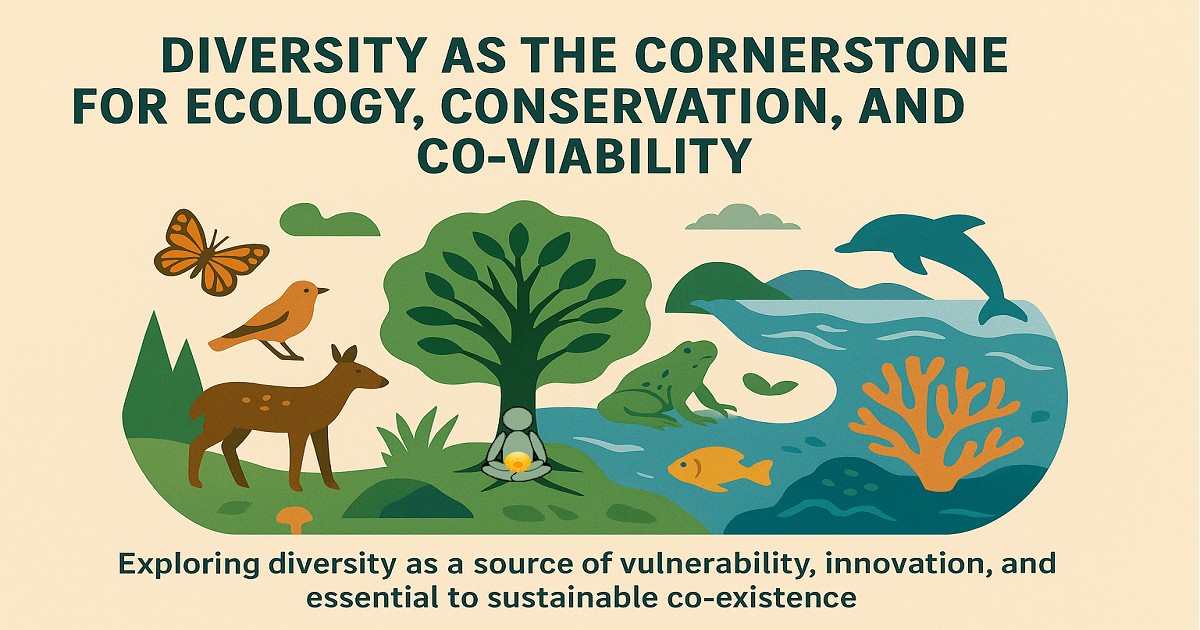Diversity as the Cornerstone for Ecology, Conservation, and Co-Viability on Earth
A special issue of Diversity (ISSN 1424-2818).
Deadline for manuscript submissions: 30 June 2026 | Viewed by 151

Special Issue Editors
Interests: artificial intelligence in conservation; biosemiotics; ecoacoustics; terrestrial ecology; traditional ecological knowledge
Special Issue Information
Dear Colleagues,
Biodiversity in ecological science has traditionally been framed as a dichotomy between human and non-human realms, reinforcing a false separation that obscures their profound interdependence. In the spirit of relational ecology, where the ontology of existence emerges through intimate interactions between living beings and their environments, the diversity of both tangible and intangible qualities in the Biosphere serves as the foundation for connection and co-evolution. Expanding biodiversity’s epistemology toward a more inclusive ontology that embraces its qualitative and quantifiable properties allows us to explore the full complexity of life. This approach moves beyond narrow paradigms focused on charismatic species, ecosystem services, and sociopolitical values, opening new pathways for understanding biodiversity as a deeply relational and co-evolving phenomenon.
Tangible properties like effective population size, species richness, and habitat structure, and intangible aspects such as cultural significance, spiritual meaning, aesthetic values, and ethical responsibility are interconnected components of life’s rich fabric. Conceptualizing biodiversity holistically allows for integrative frameworks that unite scientific, Indigenous, and philosophical knowledge, promoting a path toward sustainable co-viability between human and non-human life.
Human-driven pressures such as climate change, habitat loss, pollution, species extinctions, and cultural erasure have become the result of our species’ actions to survive. Unfortunately, the negative effects of our activities have risked the viability of non-human life while simultaneously risking our own. Yet, the diversity of anthropogenic problems and environmental consequences also coincide with human ingenuity, natural selection, and a diversity of solutions. Social and political movements that have established unprecedented environmental protection policies and land preserves, integration of Traditional Ecological Knowledge with western science, scientific progress in genetics and endangered species recovery, and the development and innovation of a burgeoning AI movement are outcomes of how diversity and relationality have charted a path toward a future of co-existence and co-viability.
As life on Earth continues to face overwhelming challenges, we invite a broad range of perspectives for this special issue of Diversity that explore the following themes:
- In what ways is diversity foundational to ecology and relational thinking?
Reflections on the epistemological and ontological dimensions of diversity, including relational properties of life and emerging complexity.
- How does diversity shape human-nature relationships in conservation, practice, and sustainability?
Insights into cultural, scientific, political, and ethical dimensions of coexistence.
- How can diversity help us understand and address global environmental challenges?
Discussions of diversity as both a source of systemic vulnerability and a wellspring of innovation and resilience.
- What frameworks and practices can leverage diversity for co-viability?
Recommendations, warnings, and visions that explore diversity’s role in shaping a livable, just future for all life.
We encourage reflections, perspectives, and insights that bridge disciplines, traditions, and generations. It is our hope that this special issue will not only provide a scholarly reference but also serve as a compass for emerging scientists and changemakers working at the intersection of ecology, culture, and planetary health.
Dr. Tim Mullet
Prof. Dr. Almo Farina
Guest Editors
Manuscript Submission Information
Manuscripts should be submitted online at www.mdpi.com by registering and logging in to this website. Once you are registered, click here to go to the submission form. Manuscripts can be submitted until the deadline. All submissions that pass pre-check are peer-reviewed. Accepted papers will be published continuously in the journal (as soon as accepted) and will be listed together on the special issue website. Research articles, review articles as well as short communications are invited. For planned papers, a title and short abstract (about 250 words) can be sent to the Editorial Office for assessment.
Submitted manuscripts should not have been published previously, nor be under consideration for publication elsewhere (except conference proceedings papers). All manuscripts are thoroughly refereed through a single-blind peer-review process. A guide for authors and other relevant information for submission of manuscripts is available on the Instructions for Authors page. Diversity is an international peer-reviewed open access monthly journal published by MDPI.
Please visit the Instructions for Authors page before submitting a manuscript. The Article Processing Charge (APC) for publication in this open access journal is 2100 CHF (Swiss Francs). Submitted papers should be well formatted and use good English. Authors may use MDPI's English editing service prior to publication or during author revisions.
Keywords
- biodiversity
- conservation
- co-viability
- human-nature interdependence
- relational ecology
Benefits of Publishing in a Special Issue
- Ease of navigation: Grouping papers by topic helps scholars navigate broad scope journals more efficiently.
- Greater discoverability: Special Issues support the reach and impact of scientific research. Articles in Special Issues are more discoverable and cited more frequently.
- Expansion of research network: Special Issues facilitate connections among authors, fostering scientific collaborations.
- External promotion: Articles in Special Issues are often promoted through the journal's social media, increasing their visibility.
- Reprint: MDPI Books provides the opportunity to republish successful Special Issues in book format, both online and in print.
Further information on MDPI's Special Issue policies can be found here.






